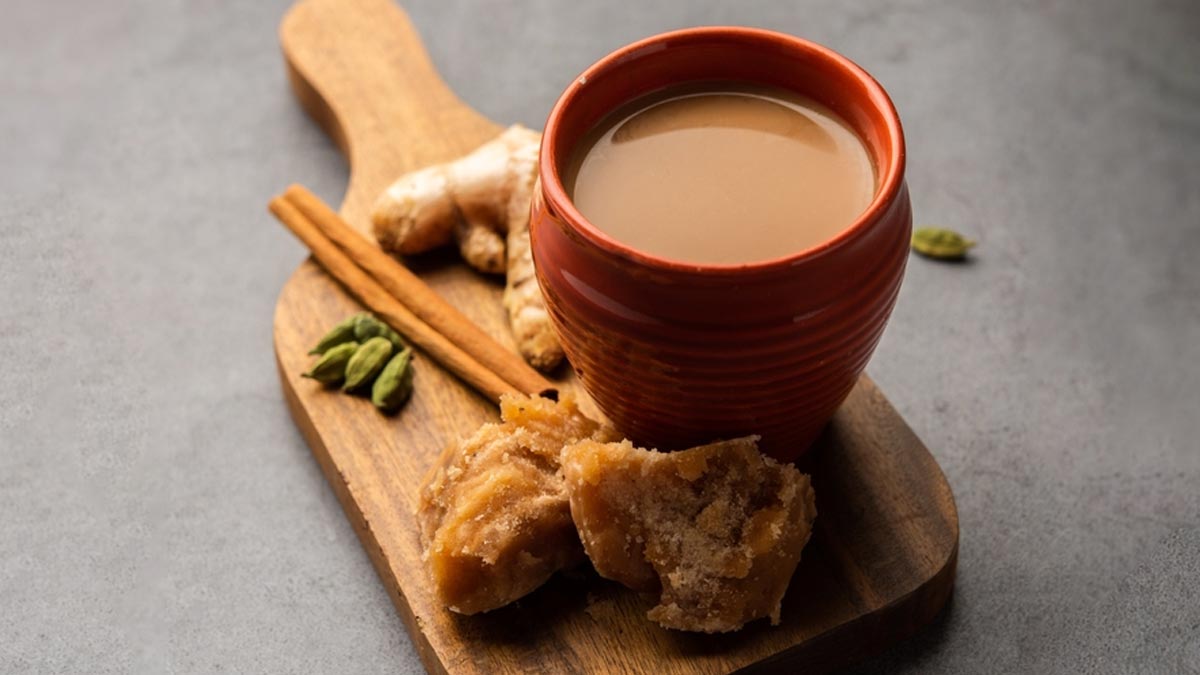
Isn’t it comforting to sip warm tea wrapped up in your blanket in colder months? What if I tell you that you can enhance this experience by improving your overall health? All you need to do is replace your traditional tea with jaggery tea. This winter elixir offers a plethora of health benefits, ranging from immune support to digestion assistance and iron enrichment. We spoke to our expert Dr Ekta Singhwal, MSc Dietician, Ujala Cygnus Group of Hospitals, who explained the benefits of drinking jaggery tea in winter.
Table of Content:-
Benefits Of Jaggery Tea In Winter
According to Sugar Tech, jaggery is a good source of calcium, which is necessary for strong bones. Jaggery also has anti-allergy qualities that assists in controlling asthma-related issues and relieves stress. It also includes iron, which helps to avoid anaemia.

Natural Sweetness and Warmth
Jaggery, a natural sweetener made from concentrated sugarcane juice, gives a rich, caramel-like flavour to tea. Dr Singhwal said, “Its natural sweetness eliminates the need for processed sugars, making it a healthier choice for those looking to cut down on refined sugars.”
Also Read: Detox Your Lungs: Benefits Of Mullein Tea To Fight Air Pollution
Boosting Immunity
You must have noticed an increase in respiratory illness and flu in winter. You can combat these issues by adding jaggery tea to your diet.
Dr Singhwal added, “Jaggery is rich in essential minerals like zinc and selenium and plays a crucial role in strengthening the immune system. These minerals contribute to the production of antibodies and help combat infections, providing a natural shield against winter-related illnesses.”

Regulating Body Temperature
Jaggery is known for its warming properties, which can be particularly beneficial during colder months. "Consuming jaggery tea helps regulate body temperature, keeping you comfortably warm from the inside. This is especially advantageous in preventing ailments associated with exposure to cold weather", added Dr Singhwal.
Iron-Rich for Winter Wellness
Did you know iron deficiency can lead to fatigue and a weakened immune system, leaving the body vulnerable to winter infections? Jaggery is a natural source of iron, making it an excellent addition to your winter diet. Iron helps in the production of haemoglobin, the oxygen-carrying component of red blood cells, ensuring adequate oxygen supply to all parts of the body.

Digestive Aid
It is common to indulge in hearty feasts in winter, however, most of the time it leads to digestive discomfort. Dr Singhwal informed, “Jaggery has digestive properties that can help alleviate issues, such as indigestion and constipation. Drinking jaggery tea after meals can act as a mild digestive aid, promoting a healthier gut during the winter season.”
Also Read: Do You Have Trouble Sleeping? Expert Lists 8 Teas That Can Help Improve Your Sleep Quality
Rich in Antioxidants
The antioxidants present in jaggery contribute to the removal of harmful free radicals from the body. This not only supports overall health but also helps in maintaining youthful skin, which may be prone to dryness and dullness during winter. Adding jaggery tea into your daily routine can thus contribute to a radiant complexion.
Energy Boost
Dr Singhwal said, "The natural sugars in jaggery provide a quick and sustained energy boost, making it an excellent choice for your winter cravings. Unlike the rapid spike and crash associated with refined sugars, jaggery provides a more stable and enduring source of energy."
Steps To Make Jaggery Tea

- Water - 1 cup
- Tea leaves or tea bags - 1 teaspoon or 1 bag per cup
- Jaggery - 1 to 2 tablespoons (adjust according to taste)
- Milk (optional) - 1/4 cup
- Spices (optional) - such as ginger or cardamom for added flavour
Instructions
- To begin, heat 1 cup of water until it reaches boiling point.
- Add 1 tsp tea leaves or a tea bag. Steep for 2-3 minutes.
- Add grated ginger or crushed cardamom for flavour.
- Reduce heat, add 1-2 tbsp jaggery. Stir until dissolved.
- Optionally, add 1/4 cup of milk. Stir.
- Let it simmer for 2-3 minutes for flavours to blend.
- Strain to remove the tea leaves. Garnish with cinnamon or lemon if desired.
[Disclaimer: This article contains information provided by an expert and is for informational purposes only. Hence, we advise you to consult your expert for a dietary plan tailored to your body type and needs.]
Also watch this video
How we keep this article up to date:
We work with experts and keep a close eye on the latest in health and wellness. Whenever there is a new research or helpful information, we update our articles with accurate and useful advice.
Current Version